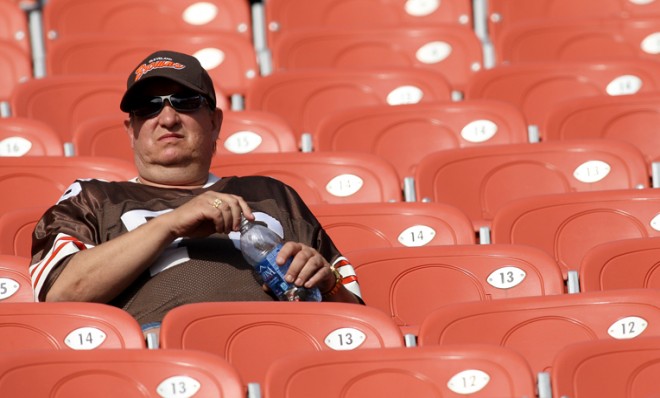Your terrible sports team is killing you
Sorry, Cleveland

A free daily email with the biggest news stories of the day – and the best features from TheWeek.com
You are now subscribed
Your newsletter sign-up was successful
Fans of the Houston Astros, Jacksonville Jaguars, and Charlotte Bobcats have yet another reason to despair: Watching those terrible teams rack up losses week after week, season after season, could be hazardous to your health.
Indeed, multiple studies have found that the stress of losing leads to all kind of problems — besides the obvious risk of putting your fist through the TV.
Cheering for the New England Patriots or the Miami Heat might go against everything you believe in. But here are three reasons you might want to consider ditching your losing team and start rooting for those winners anyway.
The Week
Escape your echo chamber. Get the facts behind the news, plus analysis from multiple perspectives.

Sign up for The Week's Free Newsletters
From our morning news briefing to a weekly Good News Newsletter, get the best of The Week delivered directly to your inbox.
From our morning news briefing to a weekly Good News Newsletter, get the best of The Week delivered directly to your inbox.
1. Your terrible team could make you fat
Researchers at INSEAD, a Paris business school, found that fans ate 28 percent more saturated fat than normal after their teams lost. Winners, on the other hand, ate 16 percent less.
"When people feel their identity is threatened, they compensate by eating indulgent food," Pierre Chandon, co-author of the study, told The New York Times. "It's more difficult to resist temptation. No one ate broccoli after a defeat."
The study tracked participants over two years of NFL Sundays and found that the biggest discrepancy between the eating habits of winners and losers was on Monday — when, back at work, New York Jets fans apparently drown their sorrows in giant plates of Buffalo wings.
A free daily email with the biggest news stories of the day – and the best features from TheWeek.com
2. Your terrible team could literally break your heart
Watching your team lose feels terrible. Watching your team lose the Super Bowl could kill.
That's the conclusion reached by researchers at the University of Southern California. They found an increase in the number of heart attacks in the Los Angeles area after the Los Angeles Rams lost Super Bowl XIV to the Pittsburgh Steelers in 1980, as compared to years when no Los Angeles teams were playing in the Super Bowl.
They found the opposite effect in 1984, when the Los Angeles Raiders beat the Washington Redskins to win Super Bowl XVIII.
"Stress may trigger cardiovascular events," Robert Kloner, author of the study, told USC News. "Emotional stress involving a local sports team, especially in a highly publicized rivalry as in the Super Bowl, is no exception. Both losing a Super Bowl game and the intensity of the game may play a role."
A similar study in Munich during the 2006 World Cup found the same thing. No matter what the sport, apparently, watching your team fall just short of winning it all could land you in the hospital.
3. Your terrible team could drive you to binge drink
College football fans do stupid things during home games, like paint their bodies or light couches on fire. Science has confirmed that some of that stupid behavior is — surprise! — connected to alcohol consumption.
Researchers at the University of Colorado studied police records from six college football seasons. The study found that alcohol-related crimes like assault and vandalism jumped considerably near college campuses during football home games, even during wins.
The numbers increased even more after losses — and really exploded when the home team was upset. In that scenario, researchers predicted a 112 percent increase in arrests for assault and a 162 percent jump in arrests for disorderly conduct.
The lesson? Stay at home, and cheer for the team with the lead. It might not be as fun, but at least you won't wake up in a drunk tank, sadly binging on Doritos Locos Tacos.
Keith Wagstaff is a staff writer at TheWeek.com covering politics and current events. He has previously written for such publications as TIME, Details, VICE, and the Village Voice.
-
 Local elections 2026: where are they and who is expected to win?
Local elections 2026: where are they and who is expected to win?The Explainer Labour is braced for heavy losses and U-turn on postponing some council elections hasn’t helped the party’s prospects
-
 6 of the world’s most accessible destinations
6 of the world’s most accessible destinationsThe Week Recommends Experience all of Berlin, Singapore and Sydney
-
 How the FCC’s ‘equal time’ rule works
How the FCC’s ‘equal time’ rule worksIn the Spotlight The law is at the heart of the Colbert-CBS conflict